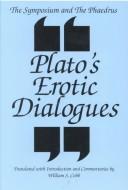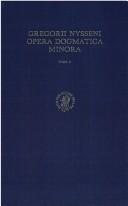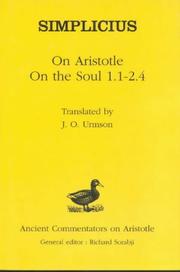| Listing 1 - 9 of 9 |
Sort by
|
Book
ISBN: 9780197265147 0197265146 Year: 2013 Volume: II Publisher: Oxford Oxford university press
Abstract | Keywords | Export | Availability | Bookmark
 Loading...
Loading...Choose an application
- Reference Manager
- EndNote
- RefWorks (Direct export to RefWorks)
Since the publication of the edition of John Blund's Tractatus de anima by the British Academy in 1970 there has been widespread acceptance of the importance of this text for the history of thought. Blund (ca. 1175-1248) was probably one of the first commentators on the libri naturales at Paris before the prohibition of 1210, and later introduced them to Oxford. Indeed, apart from the prohibitions of 1210 and 1215, the De anima of Blund is the one text which sheds light on the first reception of Aristotle at Paris. The text was probably composed at Paris, before 1204. Blund taught arts at Paris ca. 1200-1205, then at Oxford towards 1207-1209. He returned to study theology at Paris during the interdict (1208-1214) and the contemporaneous suspension of the schools at Oxford (1209-1214). He was regent in theology at Paris for twelve years, and taught theology at Oxford after 1229. With the Tractatus a whole area of philosophical speculation--namely Greek and Arabic psychology--arrived at Oxford, where it would continue to grow and be debated throughout the century. Blund did not know Averroes but he reflects the state of Latin Aristotelianism during the first third of the thirteenth century. Like his contemporaries Blund regarded the De anima of Avicenna as a commentary on Aristotle; indeed they found it clearer than the text of Aristotle and were guided by it. Blund is faithful to Aristotle and to Avicenna, rejecting, for example, the binarium famosissimum drawn from the Fons vitae of Avicebron. In expounding the doctrine of Aristotle and following the plan laid out by Avicenna, he considers the arguments for and against before offering his own reasoned position in the solutio. He defends the role of the philosopher as considering the nature of the soul and as distinct from theological considerations. This new English translation makes available this important text to a wider audience of scholars interested in philosophy, theology, medieval history and the history of science and psychology. Students who are learning medieval Latin will be able to follow the original Latin with the help of the parallel translation and text notes.
Soul. --- Philosophy, Medieval. --- Soul --- Philosophy, Medieval --- Soul - Early works to 1800

ISBN: 0791416186 0791416178 9780791416181 Year: 1993 Publisher: Albany (N.Y.) : State university of New York press,
Abstract | Keywords | Export | Availability | Bookmark
 Loading...
Loading...Choose an application
- Reference Manager
- EndNote
- RefWorks (Direct export to RefWorks)
Love --- Soul --- Rhetoric --- Early works to 1800. --- Socrates. --- Love - Early works to 1800. --- Soul - Early works to 1800. --- Rhetoric - Early works to 1800.

ISBN: 9004070036 9789004122420 9789004070035 9004122427 Year: 2014 Volume: 3/3 Publisher: Leiden Brill
Abstract | Keywords | Export | Availability | Bookmark
 Loading...
Loading...Choose an application
- Reference Manager
- EndNote
- RefWorks (Direct export to RefWorks)
#GROL:SEMI-276-05 Nyss 3.2 --- Christian dogmatics --- Patrology --- Resurrection --- Immortality (Christianity) --- Soul --- Immortality --- Christianity --- Soul - Early works to 1800 --- Resurrection - Early works to 1800 --- Immortality - Christianity - Early works to 1800
Book
ISBN: 9781780934372 1780934378 Year: 2014 Publisher: London : Bloomsbury,
Abstract | Keywords | Export | Availability | Bookmark
 Loading...
Loading...Choose an application
- Reference Manager
- EndNote
- RefWorks (Direct export to RefWorks)
In his commentary on a portion of Aristotle's de Anima (On the Soul) known as de Intellectu (On the Intellect), Philoponus drew on both Christian and Neoplatonic traditions as he reinterpreted Aristotle's views on such key questions as the immortality of the soul, the role of images in thought, the character of sense perception and the presence within the soul of universals. Although it is one of the richest and most interesting of the ancient works on Aristotle, Philoponus' commentary has survived only in William of Moerbeke's thirteenth-century Latin translation from a partly indecipherable Greek manuscript. The present version, the first translation into English, is based upon William Charlton's penetrating scholarly analysis of Moerbeke's text.
Intellekt. --- Psychologie. --- Seele. --- Aristoteles, --- Intellect --- Soul --- Psychology --- Logic --- Knowledge, Theory of --- Early works to 1800 --- Aristotle. --- Aristotle --- Intellect - Early works to 1800 --- Soul - Early works to 1800 --- Aristotle. - de intellectu --- Aristotle - De anima --- Aristotle. - Posterior analytics
Book
ISSN: 01847155 ISBN: 2251005277 9782251005270 Year: 2005 Volume: 444 Publisher: Paris Belles lettres
Abstract | Keywords | Export | Availability | Bookmark
 Loading...
Loading...Choose an application
- Reference Manager
- EndNote
- RefWorks (Direct export to RefWorks)
Philosophy of nature --- Classical Greek literature --- Biology --- Science --- Zoology --- Sciences --- Zoologie --- Early works to 1800. --- Pre-Linnean works --- Ouvrages avant 1800 --- Ouvrages prélinnéens --- Soul --- Aristotelian philosophy --- De generatione et corruptione (Aristoteles) --- Aristotle. --- Aristotelian philosophy. --- Ouvrages prélinnéens --- Soul - Early works to 1800
Book
ISBN: 9781472557872 1472557875 0715638580 9780715638583 Year: 2011 Publisher: London Bristol Classical Press
Abstract | Keywords | Export | Availability | Bookmark
 Loading...
Loading...Choose an application
- Reference Manager
- EndNote
- RefWorks (Direct export to RefWorks)
Concerning embryos, Porphyry takes an original view on issues that had been left undecided by his teacher Plotinus and earlier by the doctor Galen. What role is played in the development of the embryo by the souls or the natures of the father, of the mother, of the embryo, or of the whole world? Porphyry's detailed answer, in contrast to Aristotle's, gives a significant role to the soul and to the nature of the mother, without, however, abandoning Aristotle's view that the mother supplies no seed. In the fragments of On What is in Our Power, "Porphyry" discusses Plato's idea that we choose.
Porphyre, --- Philosophy and religion --- Philosophy. --- History --- To 1500. --- Human embryo --- Ame --- Moi (Philosophie) --- Embryon humain --- Philosophy of nature --- Metaphysics --- Embryos --- Power (Philosophy) --- Self (Philosophy) --- Soul --- Neoplatonism --- Early works to 1800. --- Early works to 1800 --- Ouvrages avant 1800 --- Soul - Early works to 1800 --- Porphyre
Book
ISSN: 07501978 ISBN: 9782204117593 2204117595 Year: 2017 Volume: 585 Publisher: Paris Les Editions du Cerf
Abstract | Keywords | Export | Availability | Bookmark
 Loading...
Loading...Choose an application
- Reference Manager
- EndNote
- RefWorks (Direct export to RefWorks)
"Interrogé par un groupe d'amis sur la nature et les pouvoirs de l'âme, Cassiodore (v. 490 - v. 587), qui fut un temps haut fonctionnaire palatin au service du roi ostrogoth Théodoric le Grand et de ses successeurs, rédigea De l'âme vers 538. Récemment converti, il prend parti sur la question de l'âme, un des lieux de controverse entre philosophie païenne et réflexion chrétienne. En dix-huit chapitres se concluant par une prière, il affirme ainsi sa foi neuve tout en réassumant sa culture classique. Il s'attache à faire apparaître l'âme comme l'instrument et le milieu qui permettent à l'homme d'abord de parvenir à sa propre connaissance et à celle du monde, révélateurs l'un et l'autre de la puissance et de la bonté de Dieu, puis de se préparer à atteindre la condition béatifi que. À partir d'emprunts aussi bien sacrés que profanes, auxquels les citations scripturaires servent de ciment, Cassiodore s'inscrit dans la tradition latine des traités sur l'âme initiée par Tertullien, et compose une oeuvre appelée à connaître une immense postérité."--
Classical Latin literature --- Christian apologetics --- Soul --- Cassiodorus, --- 276 =71 CASSIODORUS --- 276 =71 CASSIODORUS Latijnse patrologie--CASSIODORUS --- 276 =71 CASSIODORUS Patrologie latine--CASSIODORUS --- Latijnse patrologie--CASSIODORUS --- Patrologie latine--CASSIODORUS --- Soul. --- De anima (Cassiodorus, Senator). --- Âme --- Convertis au christianisme. --- Christianisme --- Aspect religieux --- Christianisme. --- Latijnse patrologie --- Soul - Early works to 1800 --- Cassiodorus, - Senator, - approximately 487-approximately 580. - De anima

ISBN: 0715626140 9780715626146 9781472558435 147255843X Year: 1995 Publisher: London : Gerald Duckworth,
Abstract | Keywords | Export | Availability | Bookmark
 Loading...
Loading...Choose an application
- Reference Manager
- EndNote
- RefWorks (Direct export to RefWorks)
Psychology --- Soul --- Early works to 1850 --- Early works to 1800 --- Aristotle. --- Early works to 1800. --- Early works to 1850. --- Aristoteles. --- De anima (Aristoteles). --- Philosophie de l'esprit - Ouvrages avant 1800. --- Âme - Ouvrages avant 1800. --- Aristoteles, --- Aristote, 0384-0322 av. J.-C. / De l'ame. --- Aristotle <384-322 B.C> / De anima. Book 1-Book 2, Chapter 4. --- Ame --- Psychologie --- Ouvrages avant 1800 --- Ouvrages avant 1850 --- Soul - Early works to 1800. --- Psychology - Early works to 1850.
Book
ISBN: 2503521126 9782503521114 2503521118 9782503521121 Year: 2003 Volume: 48 Publisher: Turnhout Brepols
Abstract | Keywords | Export | Availability | Bookmark
 Loading...
Loading...Choose an application
- Reference Manager
- EndNote
- RefWorks (Direct export to RefWorks)
Soul --- Christianity --- Isaac --- Isaac, --- Isaak --- Isacco --- Yitsḥaḳ --- יצחק --- יצחק אבינו --- Bible. --- Aga-sŏ (Book of the Old Testament) --- Asma Asmatōn (Book of the Old Testament) --- Cantar de los Cantares de Salomón (Book of the Old Testament) --- Cântarea-a Cântărilor (Book of the Old Testament) --- Cantica Canticorum (Book of the Old Testament) --- Canticle of Canticles (Book of the Old Testament) --- Canticles (Book of the Old Testament) --- Cantico dei Cantici (Book of the Old Testament) --- Canticum Canticorum Salomonis (Book of the Old Testament) --- Cantique des Cantiques (Book of the Old Testament) --- Énekek Éneke (Book of the Old Testament) --- Erg Ergotsʻ Soghomoni (Book of the Old Testament) --- Hohelied (Book of the Old Testament) --- Hooglied (Book of the Old Testament) --- Lied der Lieder (Book of the Old Testament) --- Musthikaning Kidung anggitane Sang Prabu Suleman (Book of the Old Testament) --- Musthikaning Kidung (Book of the Old Testament) --- Nashīd al-Anāshīd (Book of the Old Testament) --- Nashīd al-Anshād (Book of the Old Testament) --- Shir ha-Shirim (Book of the Old Testament) --- Solomon, Song of (Book of the Old Testament) --- Song of Solomon (Book of the Old Testament) --- Song of Songs (Book of the Old Testament) --- Soul - Early works to 1800.
| Listing 1 - 9 of 9 |
Sort by
|

 Search
Search Feedback
Feedback About UniCat
About UniCat  Help
Help News
News